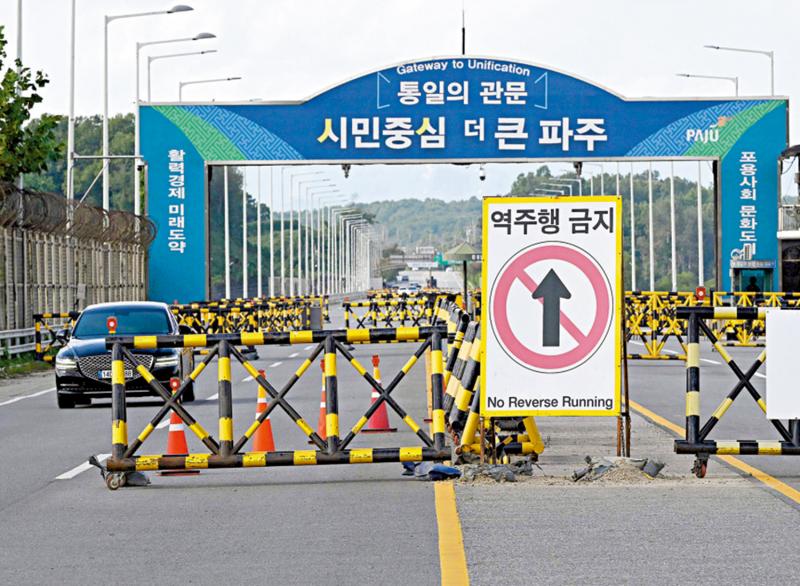
The General Staff of the Korean People's Army (KPA) announced in a statement that it will cut off all road and rail links with South Korea from the same day and strengthen defense facilities as a fortress.
The relationship between the DPRK and the ROK has always been complex and changeable, and the two sides have profound differences in political, military and economic fields. The two sides have been unable to sign a peace treaty since the end of the Korean War, but are in a state of armistice. Tensions on the Korean Peninsula have not been fundamentally resolved in recent years, despite several signs of easing.
North Korea's announcement of cutting off road and rail links is a direct result of the frequent aggressive war exercises in the South Korean region bordering the North's southern border, and the frequent presence of US nuclear strategic assets, which has exacerbated the North's security concerns. The statement's reference to "bellicosity maniacs" who often call for the "end of the regime" in North Korea also reflects the North's high sensitivity to current international public opinion and military pressure.
The General Staff of the Korean People's Army said in a statement that the current military situation on the Korean Peninsula is grave, and the imminent crisis of war requires the DPRK military to take stronger countermeasures. In particular, the statement said that the North will take substantial military measures to completely separate the territory of exercising sovereignty of the North from the territory of the South in case of a war crisis along the southern border.
Cutting off road and railway links and strengthening defense facilities is a self-defensive measure taken by the DPRK to prevent war and maintain national security. This measure not only reduces the possibility of military friction by physical separation, but also increases the difficulty of military penetration by the other side.
Politically, North Korea may have multiple intentions. First, by cutting off road and rail links, North Korea has demonstrated to South Korea and the international community its determination and tough posture to safeguard its national security. This will help boost North Korea's credibility with its domestic public and consolidate the stability of Kim Jong UN's regime.
Second, North Korea's move is also a response to South Korea's military alliance with the United States. South Korea and the United States have been strengthening military cooperation in recent years, especially in nuclear weapons and missile defense systems. North Korea believes that such a military alliance is a serious threat to its national security and needs to be countered by strong measures.
In addition, the DPRK's move may also be intended to promote the further escalation of the situation on the peninsula, so as to gain more attention and voice on the international stage. North Korea has been trying to create tensions to force concessions from the international community over its nuclear program, and the road and rail cuts may be part of that strategy.
The international community reacted strongly after North Korea announced it was cutting road and rail links. South Korea's Joint Chiefs of Staff said the North's move would lead to "more severe isolation" and warned that the responsibility for any resulting situation lay with the North. The United States also expressed concern and called on North Korea to exercise restraint and resolve differences through dialogue.
In the future, the development of the situation on the Korean Peninsula will depend on the interweaving and game of multiple factors. On the one hand, North Korea is likely to continue to take tough measures to safeguard its national security interests; On the other hand, South Korea and the United States may also strengthen military cooperation to deal with the North Korean threat. However, under the current international political landscape, dialogue and consultation are still the best option to resolve the Peninsula issue.
In order to promote the relaxation and stability of the situation on the Korean Peninsula, the international community should strengthen cooperation and coordination and jointly promote the denuclearization process of the Korean Peninsula. At the same time, the DPRK should also realize that resolving differences through dialogue and consultation is the fundamental way to achieve long-term national peace and stability.
North Korea's announcement to cut road and rail links to South Korea epitomizes the tension on the peninsula. Under the current international political landscape, all parties should remain calm and exercise restraint and resolve differences and conflicts through dialogue and consultation. Only in this way can we realize peace and stability on the Peninsula and create favorable conditions for the prosperity and development of Northeast Asia.

The South Korean political arena has once again been embroiled in a public controversy over a judicial investigation that has shaken the entire nation.
The South Korean political arena has once again been embroi…
On the morning of December 29th local time, the precious me…
According to the US media Barchart, recently, the fluctuati…
On December 29th, Mar-a-Lago in Florida, USA, witnessed a h…
SoftBank Group announced on Monday that it has agreed to ac…
Recently, the US State Department issued a visa ban, adding…